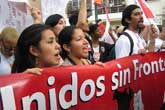The WSF on the move

With Porto Alegre hosting an evaluation of the 10 years of the World Social Forum (WSF) in January, Boaventura de Sousa Santos wonders why the mainstream media chose to focus on the World Economic Forum (WEF) in Davos instead. This is strange, writes de Sousa Santos, 'since the analyses and previsions of the WSF during the last decade turned out to be much more precise than those advanced by the WEF'.
At the end January 2010, there was an important evaluation of the 10 years of the World Social Forum (WSF) in Porto Alegre, Brazil, including a debate on its future. At the same time, many events took place in seven cities in the metropolitan region, which gathered more than 30,000 people. The major media did not report on this. Rather, they inundated their readers with details about the meeting of the World Economic Forum (WEF) taking place in Davos. This is odd, since the analyses and previsions of the WSF during the last decade turned out to be much more precise than those advanced by the WEF. In 2001, the WEF considered neoliberalism (privatisations, free trade and economic and financial deregulation) to be the final solution for the cyclical crises of capitalism. This was the case until the 2008 financial crisis, which the WEF did not foresee. The WSF, on the contrary, maintained that neoliberalism was not the sole solution, indeed, that it was the most unfair one, and that the crises that neoliberalism had been provoking in many countries smothered by the IMF’s recipes would end up striking the heart of global capitalism. This is exactly what has happened. It seems, therefore, wise to bring to light the themes that will be prominent in the WSF in the forthcoming years.
The first theme is peace and democracy. WSF’s analyses foresee the increasing militarisation of social conflicts in the next decade, including the criminalisation of social movements and citizens’ protests vis-à-vis growing economical difficulties and widening inequalities. They also take into account the discontent of victims who are always morally more honest, socially more vulnerable and politically less powerful, a triple condition plaguing the great majority of the world's population. This preoccupation concerns many of the activities scheduled for 2010, from the WSF in the USA to the eight forums to take place in the Arab or Islamic world: the first WSF in Iraq, the sixth European WSF in Turkey as well as the thematic forums featuring unions (Algeria), sexual discrimination (Tunisia and Jordan), rural workers (Egypt), peace and education (Palestine) and democracy (Bangladesh).
All this is converging toward the next edition of the unified WSF to take place in Dakar in 2011, under the topic of South–South dialogues, an emergent topic to be much heard about in the next decade. The second theme is the civilisational crisis resulting from the unsustainability of the dominant economic model. There is no question about this, even though the WEF, once again wrongly, denies it. The current economic model, based on infinite growth, indiscriminate use of natural resources, the privatisation of common goods (such as water, air and biodiversity), consumption (or desire for consumption) – as a gauge of a way of being rooted in the obsession of 'having' and a lifestyle based on the premature discarding of indifferently personal objects – is not only unfair but also unsustainable, and its dangers for mankind will soon be irreversible. What this means is that the bogus notion of civilisational superiority – on the basis of which the West excluded or destroyed whatever threatened it – turns now against itself. The response may be destructive, but it may also herald a new planetary consciousness made up of unexpected convergences among ancestral wisdom (indigenous, peasant and grassroots), environmental concerns and feminist ethics of care. The civilisational debate will be at the core of the fifth Pan-Amazonic Social Forum in Brazil and the fourth Social Forum of the Americas in Paraguay.
The third theme concerns the political subjects carrying on struggles for peace, democracy and a post-capitalist social, cultural and economic model. This is the theme that compels the WSF to reflect on itself: How to avoid squandering the transformative energies it has generated; how to build transcontinental alliances among political parties and movements with converging realistic agendas carrying new hegemonies; and how to render the world increasingly less comfortable for predatory capitalism? Perhaps the WSF should create its own WSF.
BROUGHT TO YOU BY PAMBAZUKA NEWS
* Boaventura de Sousa Santos is professor of sociology at the School of Economics, University of Coimbra, Portugal, distinguished legal scholar at the University of Wisconsin-Madison Law School and global legal scholar at the University of Warwick.
* Please send comments to [email protected] or comment online at Pambazuka News.

